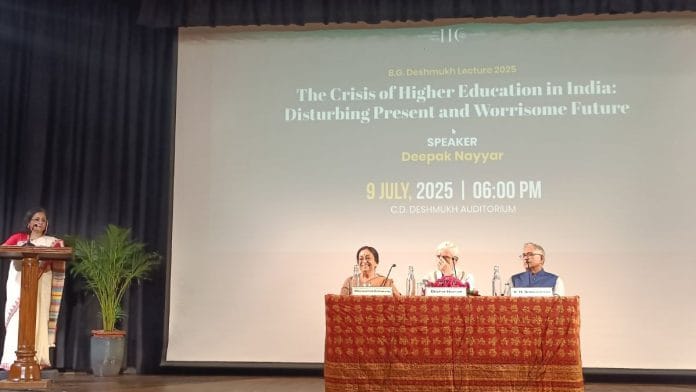New Delhi: Deepak Nayyar, economist and former Vice Chancellor at Delhi University, would abolish the University Grants Commission if given the opportunity.
According to him, the draft UGC Regulations 2025 significantly weaken institutional checks and balances in university appointments by centralising control and reducing university autonomy.
“UGC performs the functions of licensing, regulation and disbursement. These three functions are not performed by one institution anywhere in the world,” said Nayyar, at the BG Deshmukh lecture titled The Crisis of Higher Education in India: Disturbing Present and Worrisome Future at Delhi’s India International Centre.
In a 50-minute-long lecture, Nayyar talked about the symptoms of the malaise in higher education, government intervention in higher education, and institutional autonomy.
The auditorium was packed, and Nayyar acknowledged the rapt audience, which included historian Romila Thapar, former foreign secretary Shyam Saran, and former railway minister Dinesh Trivedi, as a source of both joy and nervousness.
Educationist Meenakshi Gopinath introduced Nayyar, saying, “Few can speak to the issues of governance in higher education as qualitatively and eloquently as he can.” She added that he has a formidable and exceptional combination of academic eminence and administrative acumen.
Also read: Even the Army litters Delhi’s Central Ridge. ‘People think jungle is a place to dump things’
Political intrusion in universities
Deepak Nayyar recalled that state governments began to interfere in universities in the early 1970s.
The turning point, according to him, was the Emergency, but this spread during the coalition governments from 1989.
“Every government and party interferes in the functioning of universities in India. This stifles autonomy and creativity without creating any accountability. The quality of higher education is collateral damage,” he said.
Nayyar said universities have become the arenas of political contests, adding that there has been a rapid acceleration in this process since 2019.
The ideology of the BJP and the RSS has a profound influence on higher education in India…It has now reached a stage where the future of public universities is at grave risk,” he said.
Nayyar questioned the appointment processes of faculty in universities.
“It would be no exaggeration to state that faculty appointments at universities and undergraduate colleges are increasingly driven by RSS ideology and BJP preference politics rather than talent or merit,” said Nayyar.
He said that the quality of faculty shapes the future of higher education and linked the appointment process to India’s lack of investment in human resource development.
“Universities have deteriorated rapidly in India, while in the developing world, particularly in Asia and even more so in China, they have made significant progress,” said Nayyar.
He called this a quiet crisis in India’s higher education.
“Islands of excellence, IITs, IIMs, IISc are no consolation,” he added.
It is no accident that our universities have not produced any Nobel laureates. “I think they never will in the next 25 years, the way we are going,” said Nayyar.
Also read: Climate action plans aren’t one-size-fits-all. What suits Mumbai won’t suit Bengaluru
The role of VCs
Deepak Nayyar spoke of the need for more academic freedom. Universities are centres of doubt; they should allow students to ask questions about everything.
“Knowledge develops only if we question existing knowledge. Dissenting opinions or unorthodox thinking, irrespective of the students, should be encouraged because that is how knowledge develops,” he said.
Nayyar said it is exceedingly difficult to reverse the damage that has been done to India’s educational institutions.
“It takes decades to build institutions, months to destroy them and years to rebuild institutions,” he said.
The former vice chancellor blamed not only the politicians but also the quality of leadership at universities. He said VCs do not have the courage and integrity to stand up to governments.
“If universities want autonomy, it will not be conferred on them by benevolent governments. They have to claim and consciously protect it,” he said.
(Edited by Theres Sudeep)






